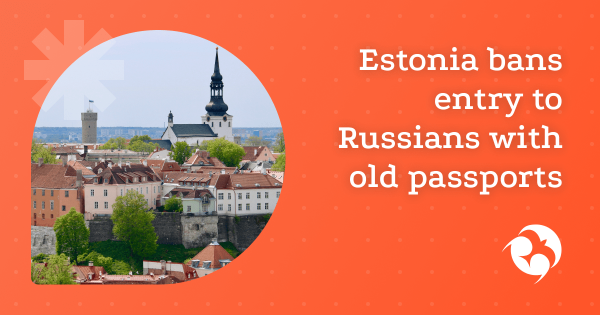Since March 31, 2025, Estonia has officially stopped recognizing non-biometric passports of Russians. From this date, arrival and stay in the country is possible only if you have a new generation biometric passport. The document must be valid for 10 years and contain a chip with the owner’s biometrics.
Features of the new rules and the transition period for residence permit holders
According to the Russian Foreign Ministry, Russian citizens should take into account that non-biometric passports with a validity period of 5 years will not be recognized by the Estonian border services and cannot be used:
- To enter Estonia.
- To obtain Schengen visas at the consular offices of the Republic.
- To confirm the identity on the territory of the country.
It is important to note that for citizens of the Russian Federation who have a residence permit in Estonia (including through a digital nomad visa) or other EU countries, there is a transitional period until 30.09.2025. At this time, you can use a non-biometric passport. However, you need to issue a biometric document no later than the specified date.
The Estonian Foreign Ministry explains this decision by saying that Russia’s non-biometric passports do not comply with the requirements of the International Civil Aviation Organization (ICAO) and may pose national security risks. The main challenges include:
- The absence of an electronic data carrier, which makes it impossible to fully verify the identity.
- The difficulty of determining the institution that issued the document.
- Difficulties in identifying invalid passports.
The international context of prohibition
According to the Russian Interior Ministry, there is a clear trend towards switching to biometric passports:
- The number of issued biometric passports increased by 41.5% (from 2.3 million to 3.25 million).
- The number of non-biometric passports issued decreased by 11.3% (from 3.51 million to 3.2 million).
- In the first half of 2024, the number of issued biometric passports increased by 96% compared to the same period in 2023.
Experts in the field of migration legislation note that such measures reflect the general tendency of EU countries to strengthen border controls and increase security. It is noteworthy that starting from November 10, 2024, passports of tourists from non-EU countries were no longer stamped at the external borders of Estonia, transferring all operations to electronic format.
Biometric passports have a number of advantages for travelers, including expedited border control and automated identity verification, which reduces the likelihood of subjective identification errors.
Russian citizens planning trips to Estonia are advised to check the relevance of their documents in advance and, if necessary, apply for biometric passports to avoid problems when crossing the border.












